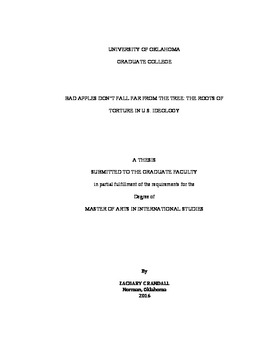| dc.description.abstract | This paper seeks to explain the extraordinary persistence of torture as an element of U.S. foreign policy. The strong international consensus against the use of torture and the apparent commitment of the U.S. to the rule of law and human rights not only make this a perplexing contradiction, but also a vital case study in the discrepancy between rhetoric and practice in foreign policy. This paper undertakes a socio-historical analysis of U.S. history, analyzing the character and causes of torture. Evidence includes the domestic torture of Native and African Americans, torture abroad in the Philippines, Japan and the institutionalization of torture in the Cold War and the War on Terror. This thesis finds that the U.S., when presented with an existential threat or enemy, often chooses to torture, a choice that is underpinned and justified by ideologies embedded deeply in U.S. political culture. In particular, American nationalism, Jacksonianism and racial superiority are imperative in the rhetoric and actions of those who commit, sanction, justify torture. These ideologies help explain the contradictory continuation of torture, may inform the broader study of U.S. foreign policy and show the roots of torture, past and present, in the political culture of the U.S. | en_US |
